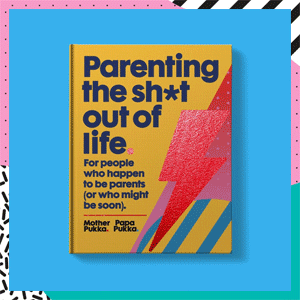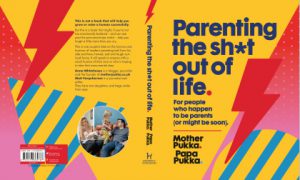

Oh, those lazy Dutch: they really don’t care about their work. Anna Whitehouse (37) often thought this when she saw her colleagues in Amsterdam go home to eat with their families at five o’clock.
“Why don’t they sit at their desk until nine in the evening, like good employees?” But after returning to work in England, she thought: well, why do we do that? “It is not that we produce more. You can’t work hard 12 hours a day”, she says.
Anna Whitehouse has a Dutch mother and an English father. It is mid December, and she’s visiting family in the Netherlands. Her sister lives in Amsterdam, her cousins in Eindhoven. We meet in the De Balie cafe, and her daughter plays with the wires of her mother’s iPhone and a leaking cup of apple juice on the floor.
Whitehouse worked in Amsterdam for six years, as a journalist for Time Out and a copywriter for the magazine of Supertrash, the now closed fashion brand of Olcay Gulsen. Her husband was at that time editor Holland Herald, the in-flight magazine of KLM. When their eldest daughter was born, they decided to move back to London, to be closer to their family, where Whitehouse got a job at the l’Oreal Group. When her office was moved half-an-hour further away, she asked if she could start and finish her day 15 minutes earlier to be able to collect her daughter from the crèche. But the answer was no: they felt that would open the doors for anyone who wanted to work flexibly.
It came to a crunch one afternoon when Whitehouse was on the way from work to the crèche. A man got his briefcase stuck between the Tube door, which stopped the train. Whitehouse was 12 minutes late to the crèche.
“My daughter looked at me with those big Bambi eyes: why am I the last one?” The crèche charged a pound for every minute a child was picked up after 6 pm. And Whitehouse received a sermon from the manager: that this should never happen again.
“I didn’t have such stress here. I cycled everywhere in Amsterdam. I knew it would take five minutes to get from a to b. In London it can take hours. You do not just jump on the bike there: the traffic is always fixed and the metro system is outdated. ”
She decided to quit her job and start working for herself. She now runs Mother Pukka, a platform for people who happen to be parents. She also wrote a book, Parenting the Shit Out of Life, and presents a radio program about the struggles of family life – the good, the bad and the ugly.
Via her own site and Instagram, she runs the Flex Appeal campaign for more flexible working in the United Kingdom. What makes her an expert? “I am not an expert! I am just a very, very angry woman who has been forced out of a regular job, simply because I had a child.
Originally she wanted to call her brand Motherfucker, she was so angry. She turned it into the more friendly Mother Pukka because she wanted people to see more than just her anger. And, let’s face it, Whitehouse does not look like an angry woman. She drinks her cold oatmeal cappuccino in a good mood while she wipes the apple juice from the floor with her other hand. And at the same time she tells the story with which she has become the face of the struggle for more flexible working in the United Kingdom. “54,000 women a year lose their jobs in the UK because they have children. Most of them stop because their work has become too inflexible, or simply because of discrimination.” She rolls with her eyes: “Oh god, we have a mother here! In England women take off their wedding ring when they go to interviews, to prevent an employer from thinking that they will want to start having children soon.”
It was her time in Amsterdam that showed her things could be done differently, she says: that you do not have to be ashamed work part-time, and that it is not ridiculously sentimental to want to take care of your child when it is sick.
Maternity leave in England can last up to 12 months, but when you come back you often have to start working full-time again.
“While you have experienced something very big. You have been biologically altered, your world is turned upside down, you have scars, you may have had a postnatal depression, you still have leaking breasts. But in England they refuse to see the person behind the employee. In the Netherlands you have shorter leave, but then there is a papadag, a mamadag concept to give people one day off a fortnight to be with their child,” she says.
“The whole view on family life here is different. We eat a sandwich behind our desk ¬– in the Netherlands you have lunch in the cafeteria and you talk about your private life.”
But there are British companies that are doing well. Take Pursuit Marketing, in Glasgow. They decided a few years ago to go to a four-day work week with their employees on the same salary.
“Their productivity has increased by 30 percent, their turnover has doubled! Because their staff are happier and healthier, see their family and work harder in four days because they get that fifth day. They feel that they are trusted.” Because that’s what it’s all about: trust.
“Employers say: but they will all be sitting at home in their underwear watching The Kardashians! But the person who would do that, if she were in the office, might waste her time stalking her ex on Facebook. Then it’s not flexibility that’s a problem, but with your recruitment. Employers say: what if I can not see my people. We say: do not look at where they are, see what they do!”
It is not a bonus to manage your own time, but a profitable principle. Employers are starting to see that very slowly now, she says: that it is good for your company to give people space.
“Ask your employee what he wants, what’s bothering him: is it your child, do you have a sick mother? And ask him how you can help him so he can perform better for the company. It’s about money. ”
The irony is her campaign for a better division between work and life eats up at least 55 hours per week.
“It is seven days a week. Everything is digital and continues throughout the day. Mae is in school, Eve three or four days at the crèche. If she is ill, one of us can pick her up, everything is much more natural, but my fight for flexibility totally exhausts me. That is the ridiculous thing: giving people independence the risk is not that they do too little, but that they do not stop working!”
Whitehouse finds the Swedish approach inspiring. “The costs for childcare are limited at a maximum €135 a week. I paid £1,350 pounds a month for three days nursery: that meant that I earned £50 pounds a week after taxes and childcare. That is almost paying to go to work: you’re saying hey, give me £50 so that I can not see my children anymore! That’s what it comes down to.”
A while ago she was with an American colleague from The New York Post in Sweden. “She said to me: what are all these male nannies doing here everywhere? It’s so weird. The Swedish woman with us said: they are not nannies, that are fathers who take care of their children! ‘Latte dads’ they are called them. Then I realized how far the Swedes are ahead of us.”
This is a translation of an article that originally appeared in Het Parool.












